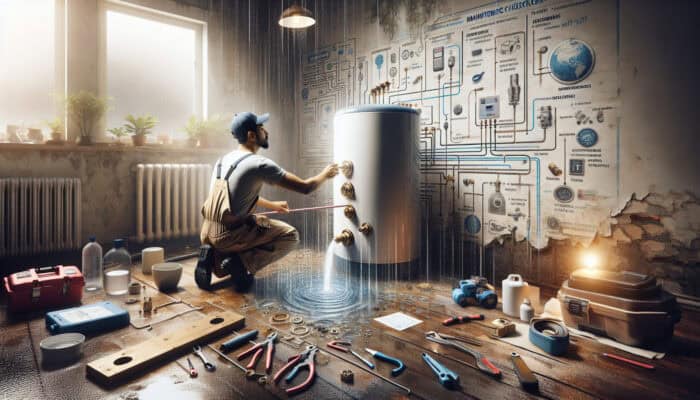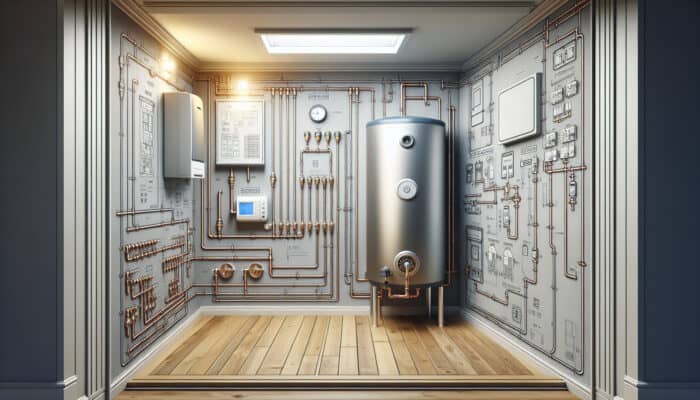Explore Essential Hot Water Tank Services for Your Home
Key Hot Water Tank Services Every Homeowner Should Be Aware Of

In Vancouver, hot water tank services encompass crucial operations including installation, maintenance, and repair of water heating systems, which are vital for maintaining comfort in every household. Given Vancouver’s damp and chilly climate, having consistent access to hot water is not merely a luxury; it is a basic necessity for everyday living. These specialized services guarantee that residents can rely on hot water for bathing, cooking, cleaning, and a myriad of essential domestic activities.
Regular maintenance and servicing are pivotal in averting common problems that often plague hot water systems, thus ensuring they function efficiently and reliably. This aspect of home upkeep is frequently overlooked, yet it has a significant impact on the homeowner’s comfort and the overall energy efficiency of the property. A well-maintained hot water tank not only enhances the quality of daily life but can also lead to reduced utility expenses, making hot water tank services a prudent investment for any homeowner.
Uncover the Various Types of Hot Water Tanks Available in the Market
A diverse range of hot water tanks is accessible today, each tailored to fulfill specific homeowner needs and preferences. The primary types include traditional tank systems, tankless water heaters, and heat pump water heaters, with each offering distinct advantages suited to different household requirements.
Traditional tank systems are capable of storing substantial volumes of hot water, making them ideal for larger families or homes with considerable hot water demands. Typically, these tanks are available in sizes ranging from 30 to 80 gallons. In contrast, tankless water heaters heat water on demand, eliminating the need for a storage tank and providing a more energy-efficient option for smaller households or those with lower hot water consumption. Lastly, heat pump water heaters utilize electricity to extract heat from the surrounding air or ground to heat the water, offering an environmentally friendly choice for eco-conscious consumers.
Selecting the most appropriate hot water tank necessitates evaluating various factors, including energy efficiency, available installation space, and the specific hot water needs of the household. Each type presents unique advantages and installation requirements, making it crucial to align them with the homeowner’s individual circumstances and lifestyle preferences.
The Importance of Regular Maintenance for Hot Water Tanks
The importance of routine maintenance for hot water tanks cannot be emphasized enough. Regular inspections and servicing can prevent unforeseen failures, extend the lifespan of the system, and enhance energy efficiency. Proactive maintenance allows homeowners to identify potential issues before they escalate into expensive repairs, enabling timely interventions that prevent significant inconveniences.
For example, routinely flushing the tank to eliminate sediment buildup is a critical maintenance task that can significantly enhance heating efficiency. Sediment accumulation can occur over time, leading to reduced performance and increased energy consumption. Regular inspections also ensure that all components, including the thermostat and pressure relief valve, are functioning correctly. Homeowners who prioritize routine maintenance can expect improved efficiency, reduced energy bills, and a longer lifespan for their hot water tanks, making it an essential aspect of responsible homeownership in Vancouver.
Strategies for Identifying the Best Hot Water Tank for Your Home

Assessing Your Household’s Hot Water Requirements
Choosing the right hot water tank begins with a comprehensive evaluation of your household’s hot water needs. It is important to consider the number of residents in your home and their daily hot water usage patterns to identify the appropriate tank capacity and type. For instance, a family of four will likely require a larger tank compared to a single occupant.
Factors such as the number of bathrooms, frequency of laundry, and peak usage times will significantly influence this assessment. Additionally, energy efficiency should be a top priority; high-efficiency models might involve a higher initial investment but can result in substantial long-term savings on energy bills. Space limitations in your home can also dictate which type of tank is most suitable for installation. While tankless systems may demand a greater upfront cost, they can save both space and energy over time, making them an efficient choice for smaller homes.
By thoughtfully considering these elements, homeowners can make informed decisions that balance capacity, efficiency, and cost, ultimately ensuring a hot water solution that integrates seamlessly into their lifestyle.
Evaluating Energy Efficiency Ratings for Hot Water Tanks
Understanding energy efficiency ratings is essential when selecting a hot water tank that can contribute to reduced energy costs. Look for models that carry the Energy Star certification, as these units adhere to strict energy efficiency standards established by the U.S. Environmental Protection Agency. A high energy efficiency rating signifies that the unit is engineered to consume less energy while still delivering the same volume of hot water.
For example, traditional storage tanks usually have an Energy Factor (EF) rating that indicates their efficiency. In contrast, tankless models often achieve a higher EF due to their on-demand heating capabilities, which eliminate standby heat loss—a common issue associated with conventional tanks. When comparing options, it is important to consider both the initial investment and potential long-term savings on energy bills. Although an efficient model may carry a higher purchase price, the cumulative savings over its lifespan can significantly outweigh the initial cost.
In Vancouver, where energy prices can fluctuate greatly, opting for an energy-efficient hot water tank not only enhances personal savings but also fosters environmental responsibility. This dual benefit creates a favorable scenario that benefits both homeowners and the planet.
Essential Factors to Consider for Hot Water Tank Installation

When preparing for a hot water tank installation, several key factors must be considered to ensure a smooth and compliant process. First, evaluate the available space in your home for the new unit. Hot water tanks require adequate space not only for installation but also for future maintenance access.
Next, consider the type of fuel your system will require, whether it be natural gas, electricity, or propane. Each fuel type has specific installation guidelines and safety protocols that must be strictly followed. Furthermore, it is essential to familiarize yourself with local building codes and regulations in Vancouver governing hot water tank installations, as adherence to these standards is critical for both safety and to avoid potential penalties.
Finally, plumbing modifications may be necessary during the installation process, especially if transitioning from one type of system to another. Hiring a professional service provider can help navigate these complexities effectively, ensuring that the installation meets all safety and regulatory standards while functioning optimally within your home.
How to Compare Different Hot Water Tank Models Effectively
Selecting the appropriate hot water tank necessitates a thorough evaluation of various models available and how they align with your household’s needs and budget. Traditional tank models, which store hot water for immediate use, often come with lower upfront costs but can incur higher operational expenses over time due to energy consumption.
Tankless systems offer the benefit of heating water on demand, thereby reducing the need for storage and minimizing energy waste. However, they usually come with a higher installation cost and might struggle to provide adequate hot water during peak usage times, depending on the size of the household and usage habits.
Hybrid systems, which combine the benefits of both traditional and tankless designs, can be particularly appealing for families seeking energy efficiency without sacrificing capacity. Each type possesses its own set of pros and cons that require careful consideration.
For instance, while traditional tanks are reliable and widely understood, tankless alternatives can offer long-term savings and enhanced efficiency. Assessing your household’s specific hot water needs, space constraints, and budget will help identify the best fit, ensuring a sound investment for your Vancouver home.
Insights from Experts on Hot Water Tank Services in Vancouver
Success Stories Highlighting Effective Hot Water Tank Installations
Successful hot water tank installations in Vancouver serve as excellent case studies showcasing the effectiveness and reliability of these services. One notable instance involved a family in East Vancouver who experienced inconsistent hot water supply issues stemming from an outdated traditional tank. After a needs assessment, a local service provider recommended a high-efficiency tankless model, resolving their hot water issues while also achieving a 30% reduction in their monthly energy bills.
Another case features a homeowner in Kitsilano, who opted for a hybrid water heater. This unit fit seamlessly into their existing space while delivering significant energy savings and a consistent supply of hot water, even during peak usage times.
The primary benefits of investing in professional hot water tank services include:
- Enhanced energy efficiency, leading to reduced utility bills.
- Increased dependability and consistent availability of hot water.
- Extended lifespan of the hot water system.
- Expert guidance on selecting the most suitable system tailored to your home’s specific needs.
- Compliance with local regulations and safety standards.
These examples emphasize the importance of selecting experienced professionals for installations, ensuring homeowners experience both comfort and peace of mind.
Proven Maintenance Strategies for Homeowners
Conducting basic maintenance tasks is vital for prolonging the lifespan and efficiency of your hot water tank. Here’s a comprehensive guide to empower homeowners in keeping their systems running optimally:
1. Flushing the Tank: This essential procedure eliminates sediment buildup that can hinder efficiency. Begin by turning off the power and cold water supply, then connect a hose to the drain valve and allow the tank to drain completely.
2. Testing the Pressure Relief Valve: This safety feature prevents excessive pressure from accumulating in the tank. Test it by briefly lifting the lever to ensure it releases water and reseals properly.
3. Checking for Leaks: Regularly inspect all connections and the tank itself for any signs of leaks, which can indicate a failing unit.
4. Monitoring Temperature Settings: Make sure the thermostat is set to the optimal temperature, typically around 120°F, to prevent scalding and reduce energy consumption.
By adhering to these maintenance tasks, homeowners can significantly enhance their hot water tank’s performance while avoiding costly repairs. A consistent maintenance regimen not only extends the system’s lifespan but also ensures energy efficiency, benefiting both the household and the environment.
Expert Insights on Achieving Energy Savings Through Efficient Upgrades
Upgrading to a more energy-efficient hot water tank model can result in considerable energy savings for homeowners. For instance, transitioning from an older traditional tank to a modern tankless system can potentially reduce energy consumption by 24-34% for homes that utilize moderate amounts of hot water.
Conducting a thorough cost-benefit analysis can help homeowners understand the financial implications of such an upgrade. Although initial costs may be higher for energy-efficient models, the long-term savings on energy bills often justify this investment. Generally, a new high-efficiency system can pay for itself within 5 to 10 years through reduced energy expenses.
Furthermore, the environmental advantages of adopting energy-efficient systems are significant. By minimizing energy consumption, homeowners contribute to lowering greenhouse gas emissions, aligning with sustainability efforts in Vancouver. The dual benefit of saving money while being environmentally conscious makes upgrading to energy-efficient hot water systems an attractive option for modern homeowners.
Common Issues with Hot Water Tanks and Effective Troubleshooting Techniques
Many homeowners in Vancouver face common challenges with their hot water tanks that can frequently be resolved using straightforward troubleshooting techniques. Some prevalent issues include:
- Leaking tanks: Often caused by corrosion or loose connections. Inspecting the tank and tightening connections can help remedy this issue.
- Noisy operation: Sounds such as popping or rumbling may indicate sediment buildup. Flushing the tank can restore quiet operation.
- Inconsistent water temperatures: A malfunctioning thermostat or sediment accumulation may be the underlying cause. Regular maintenance checks can help maintain stable temperatures.
- Insufficient hot water supply: This could result from an undersized tank. Reevaluating household needs and tank capacity may be necessary.
Homeowners should remain mindful of these common issues and conduct regular inspections to identify and address problems before they escalate. Early detection and timely troubleshooting can save both time and money, ensuring a more reliable hot water supply for the home.
Identifying and Addressing Common Problems With Hot Water Tanks
What Are the Primary Causes of Hot Water Tank Leaks?
Hot water tank leaks can arise from various issues, primarily involving corrosion, loose connections, or a malfunctioning pressure relief valve. Corrosion is frequently the leading cause, especially in older tanks that have not received adequate maintenance or servicing. Over time, the metal of the tank can deteriorate, resulting in leaks.
Loose connections at the inlet and outlet pipes can also result in water escaping. Regular inspections and maintenance can help detect these issues early on. Additionally, the pressure relief valve, which is designed to release excess pressure, may fail due to wear and tear over time, leading to leaks. Promptly identifying the source of a leak is crucial for effective repairs and minimizing water damage to your home.
To address leaks, it is essential to immediately shut off the water supply and power to the tank. If the leak is minor, tightening connections may resolve the issue. However, significant leaks will likely necessitate professional intervention, including replacing the tank or its components.
How to Resolve Noisy Tank Issues
Noisy hot water tanks can be a nuisance for homeowners, often signaling underlying issues that should be addressed. Common causes of noise in hot water tanks include sediment buildup, loose heating elements, or high water pressure.
Sediment accumulation at the bottom of the tank can lead to popping or rumbling noises as the heating element works harder to heat the water. Regularly flushing the tank can alleviate this problem and restore quiet operation. If the heating elements are loose, tightening them may resolve any rattling sounds.
High water pressure can create whistling or banging noises, indicating that the system may need a pressure regulator. Homeowners experiencing persistent noise should investigate these potential causes to avoid further damage and ensure optimal performance from their hot water tanks.
How to Handle Inconsistent Water Temperatures
Experiencing inconsistent water temperatures is a common frustration for users of hot water tanks. This issue can stem from several factors, including a malfunctioning thermostat, sediment buildup, or a failing heating element. A faulty thermostat may not accurately gauge the water temperature, leading to fluctuations in hot water availability.
Sediment buildup can obstruct the heating element, hindering efficient heat transfer and causing temperature inconsistencies. Regular maintenance, including flushing the tank, can help alleviate this issue. Lastly, if the heating elements are damaged or worn out, they may not heat the water consistently. Checking and potentially replacing these elements can resolve the problem.
Homeowners must perform regular checks and maintenance to ensure consistent water temperatures and prevent costly repairs due to neglect.
A Step-by-Step Overview of the Hot Water Tank Installation Process
What to Anticipate During Your Hot Water Tank Installation
The installation process of a hot water tank is a thorough task that typically requires several hours to complete. Initially, a professional installer will assess your home’s plumbing and determine the optimal location for the new unit. If you are replacing an existing tank, the old unit will be carefully removed and disposed of in accordance with local regulations.
Once the assessment is completed, the installer will prepare the site, ensuring the area is clear and accessible for the installation. The new hot water tank will then be installed, with connections made to the plumbing and electrical (or gas) supply. After the installation, comprehensive testing will be conducted to ensure everything operates correctly before the technician departs.
Expect clear communication throughout the installation process, as a reputable service provider will explain each step and address any questions or concerns you may have. This transparency helps homeowners feel secure that their new hot water tank is safe and compliant with local codes.
What Safety Measures and Compliance Standards Are Followed During Installation?
Professional installers adhere to stringent safety measures and compliance standards throughout the installation of hot water tanks. This adherence ensures that the installation is conducted safely and minimizes the risk of future accidents or failures. Installers must familiarize themselves with local building codes and regulations, which cover aspects such as tank placement, venting, and electrical connections.
Safety protocols include confirming that the power supply is turned off before installation, securely connecting all plumbing and gas lines, and performing leak tests once the installation is complete. Additionally, installers are trained to identify potential hazards, such as gas leaks or electrical issues, ensuring a safe environment for the homeowner.
By selecting a licensed and experienced service provider, homeowners can be confident that their hot water tank installation will be carried out by professionals dedicated to safety and compliance, providing peace of mind.
What Post-Installation Checks and Adjustments Are Necessary?
Upon completion of the hot water tank installation, technicians perform essential post-installation checks and adjustments to ensure optimal performance. These checks include testing the heating elements, verifying thermostat settings, and confirming that all connections are secure.
Technicians will also adjust the temperature settings to recommended levels to prevent scalding and enhance energy efficiency. Providing homeowners with guidance on operating the new system is another crucial aspect of the post-installation phase. Understanding how to use and maintain the hot water tank effectively can lead to better performance and a longer lifespan.
Post-installation follow-up is vital, as it ensures that homeowners are fully informed about their new system, promoting a positive experience with their hot water tank. Any questions or concerns can be addressed during this phase, underscoring the importance of professional installation services.
What Tools and Equipment Are Utilized During Installation?
Installing a hot water tank necessitates a variety of specialized tools and equipment to ensure a secure and efficient process. Installers typically use pipe wrenches to tighten and secure plumbing connections, preventing leaks. Soldering equipment may also be necessary for joining copper pipes, which is essential for creating durable, leak-proof connections.
Pressure gauges are employed to assess water pressure and ensure the system operates within the recommended parameters, averting potential issues down the line. Additionally, installers may utilize drills, levels, and other essential hand tools to facilitate the installation process.
By employing these specialized tools, professional installers can guarantee that the hot water tank is installed correctly, safely, and ready for day-to-day use. Homeowners should always seek technicians equipped with the right tools and expertise to manage their hot water tank installations effectively.
Vital Maintenance Guidelines for Hot Water Tanks
How Frequently Should You Schedule Service for Your Hot Water Tank?
Regular servicing of your hot water tank is essential for maintaining peak performance and extending its lifespan. Homeowners are advised to schedule annual servicing to keep their systems in optimal condition. This routine maintenance typically involves flushing the tank to remove sediment that can accumulate over time, checking the pressure relief valve, and inspecting other critical components for signs of wear and tear.
Annual servicing not only helps prevent unexpected breakdowns but also ensures that your hot water tank operates efficiently, potentially leading to significant energy savings. Additionally, adhering to a regular service schedule can prolong the lifespan of your hot water tank, ultimately saving you money on replacements and repairs.
By prioritizing annual maintenance, homeowners can enjoy a reliable supply of hot water while avoiding the inconveniences and expenses associated with a malfunctioning system.
What DIY Maintenance Tasks Can You Undertake to Extend the Life of Your Hot Water Tank?
Homeowners can effectively perform simple DIY maintenance tasks to prolong the life of their hot water tanks. These tasks include checking the pressure relief valve, inspecting for leaks around connections, and monitoring the tank’s temperature settings.
One straightforward task involves checking the pressure relief valve, which serves as a safety mechanism to prevent excessive pressure build-up. By occasionally lifting the lever, homeowners can confirm that the valve operates correctly and releases water as intended.
Inspecting for leaks is another critical task; homeowners should examine the area around the base of the tank and at the connections for any signs of water. Early detection of leaks can prevent significant water damage and costly repairs. Moreover, monitoring the temperature settings on the thermostat is essential, as keeping the temperature around 120°F can enhance efficiency and reduce the risk of scalding.
By regularly performing these simple tasks, homeowners can maintain their hot water tanks effectively and identify potential issues before they escalate.
When Should You Seek Professional Assistance for Your Hot Water Tank?
While homeowners can manage many maintenance tasks independently, certain situations necessitate professional help. If you observe significant leaks, unusual noises, or if the tank fails to produce hot water as expected, it is crucial to seek professional assistance.
Persistent or worsening leaks can indicate underlying issues that require expert intervention. Similarly, if you hear banging or popping sounds that do not resolve after flushing the tank, this might signal a more serious problem that needs addressing.
Finally, if the hot water tank fails to heat water consistently, it may warrant repairs or replacement of its components. Prompt action from a professional can prevent further damage and ensure that your hot water system operates efficiently. Homeowners should not hesitate to contact professionals when confronted with significant issues, as this can save time, money, and hassle in the long run.
Research-Backed Benefits of Hot Water Tank Services in Vancouver
What Do Studies Indicate About Improvements in Energy Efficiency?
Research indicates that modern hot water tanks can significantly reduce energy consumption, leading to lower utility bills and a smaller carbon footprint. Upgrading to energy-efficient models often results in reductions in greenhouse gas emissions, which positively contributes to environmental sustainability.
Studies show that homeowners who invest in high-efficiency hot water tanks can save a considerable percentage on their energy bills over time. For example, transitioning from an older model to a new EnergyStar-certified unit can lead to savings of up to 20% annually. This reduction not only benefits individual households financially but also supports broader energy conservation initiatives in Vancouver.
These improvements in energy efficiency present strong incentives for homeowners to consider upgrading their hot water systems, aligning personal financial advantages with environmental stewardship.
How Do Longevity and Cost Savings Intersect with Regular Maintenance?
Data suggests that consistent maintenance and timely upgrades to hot water tanks can extend their lifespan, resulting in long-term cost savings for homeowners. A well-maintained hot water tank can last up to 15 years or more, while neglected systems may fail much sooner, leading to unexpected replacement costs.
Moreover, the expense associated with maintaining a hot water tank is generally far less than the cost of emergency replacements. Preventative measures such as annual servicing, tank flushing, and routine inspections can cost a fraction of what homeowners would incur in the event of a complete breakdown. By prioritizing maintenance, homeowners can enjoy reliable hot water while avoiding unnecessary financial burdens.
Investing in a high-quality hot water tank and committing to its regular maintenance can yield substantial savings over time, emphasizing the importance of hot water tank services in Vancouver.
What Is the Environmental Impact of Efficient Hot Water Systems?
Efficient hot water tanks not only provide economic advantages for homeowners but also make a significant positive contribution to the environment. By decreasing energy consumption, these systems play a vital role in reducing greenhouse gas emissions.
- Lower energy costs for homeowners.
- A reduced carbon footprint achieved through decreased energy usage.
- Support for local and global sustainability initiatives.
- Increased reliance on renewable energy sources when integrated with solar hot water systems.
As awareness of environmental issues intensifies, the demand for eco-friendly home solutions continues to grow. Efficient hot water tanks align with eco-conscious living, enabling homeowners to make responsible choices that benefit both their households and the planet.
How to Select the Right Hot Water Tank Service Provider
Key Qualities to Look for in a Reliable Service Provider
Finding the right service provider for hot water tank services necessitates careful consideration of several essential factors. First and foremost, ensure that the professionals are licensed and insured, providing peace of mind that they meet industry standards for safety and quality.
Next, seek out service providers with positive reviews and a strong track record of reliable service within the Vancouver community. Word-of-mouth recommendations and online reviews can offer valuable insights into the quality of their work. Additionally, inquire about warranties and after-sales support, as these can enhance your experience and protect your investment.
Ultimately, the ideal service provider should demonstrate a commitment to customer satisfaction and possess the expertise required to address your specific hot water tank needs effectively.
How to Effectively Compare Quotes for Hot Water Tank Services?
When seeking hot water tank services, obtaining multiple quotes from different providers is a prudent strategy. This approach allows homeowners to compare prices, services offered, and the reputation of each service provider.
Ensure that you have a clear understanding of what each quote encompasses, including installation costs, warranties, and any necessary permits. Comparing quotes enables you to identify the best value for your investment while ensuring that you receive high-quality service tailored to your needs.
By taking the time to compare service quotes, homeowners can make informed decisions that align with their budget and expectations for hot water tank services.
Why Is Local Expertise Essential When Selecting a Service Provider?
Choosing a local service provider for hot water tank services offers numerous benefits. Local professionals possess an understanding of the specific needs and regulations of Vancouver, ensuring that their services comply with local codes and are tailored to the area’s unique climate conditions.
Moreover, local service providers are often better positioned to respond promptly to emergencies and provide timely support for maintenance and repairs. Their familiarity with the community and its distinct challenges enables them to deliver personalized service that larger, national companies may not offer.
Investing in local expertise ultimately leads to superior service and a more satisfactory experience for homeowners in Vancouver.
How to Assess the Quality of Customer Service in Hot Water Tank Providers?
Evaluating the quality of customer service is a crucial factor in selecting a reliable hot water tank service provider. Pay attention to the responsiveness and helpfulness of their customer support team. A service provider that prioritizes customer satisfaction is likely to ensure a smooth experience from start to finish.
Consider reaching out with questions before committing to a service provider. Their willingness to assist and provide clear, informative answers can serve as a strong indicator of their commitment to delivering high-quality service. Positive interactions with customer service can significantly enhance your overall experience and satisfaction with the provider.
In the competitive market of hot water tank services, excellent customer service can set a provider apart, making it essential for homeowners to consider this aspect when selecting a service.
Why Is It Important to Verify Emergency Services Availability?
Emergencies concerning hot water tanks can arise unexpectedly, making it crucial to select a service provider that offers emergency repair and maintenance services. Inquire about their availability for urgent situations, as quick response times are vital for preventing further damage to your home.
A reliable service provider should be equipped to handle urgent repairs efficiently, ensuring that you are not left without hot water for extended periods. Checking their emergency services availability grants homeowners peace of mind, knowing they will receive prompt assistance when needed, thereby safeguarding their comfort and convenience.
Frequently Asked Questions About Hot Water Tanks
What Is the Average Lifespan of a Hot Water Tank?
The average lifespan of a hot water tank typically ranges from 10 to 15 years, depending on the type and the level of maintenance it receives.
How Often Should I Flush My Hot Water Tank?
It is advisable to flush your hot water tank at least once a year to remove sediment build-up and maintain optimal efficiency.
What Are the Signs That My Hot Water Tank Needs Repair?
Signs that your hot water tank may require repair include leaks, unusual noises, inconsistent water temperatures, or a complete lack of hot water.
Can I Install a Hot Water Tank on My Own?
While DIY installation is possible, it is highly recommended to hire a professional to ensure safety, compliance with local codes, and proper functionality of the system.
What Are the Benefits of Tankless Water Heaters?
Tankless water heaters provide on-demand hot water, are more energy-efficient, and occupy less space compared to traditional tank systems.
How Do I Choose the Right Size Hot Water Tank?
Assess your household’s hot water usage patterns and the number of occupants to determine the appropriate size and capacity for your hot water tank.
What Maintenance Tasks Can I Perform on My Hot Water Tank?
Homeowners can perform tasks such as checking the pressure relief valve, inspecting for leaks, and regularly monitoring the temperature settings to maintain their hot water tanks effectively.
What Is the Cost of a New Hot Water Tank Installation?
The cost of installing a new hot water tank can vary widely, depending on the type of tank, the complexity of the installation, and local labour rates, generally ranging from $800 to $2,500.
How Can I Improve the Energy Efficiency of My Hot Water Tank?
Improving energy efficiency can be achieved through regular maintenance, insulating the tank, adjusting the temperature setting, and selecting energy-efficient models.
What Should I Do If My Hot Water Tank Is Leaking?
If your hot water tank is leaking, immediately shut off the water supply and power, then contact a professional for assessment and repair to prevent further damage.
Connect with us on Facebook!
Presented By: Hot Water Tank in Vancouver
The Article: Hot Water Tank Services in Vancouver: Your Local Experts First Published On: https://pacificbluemechanical.ca/
The Article Hot Water Tank Services: Vancouver’s Local Experts Was Found On https://limitsofstrategy.com

